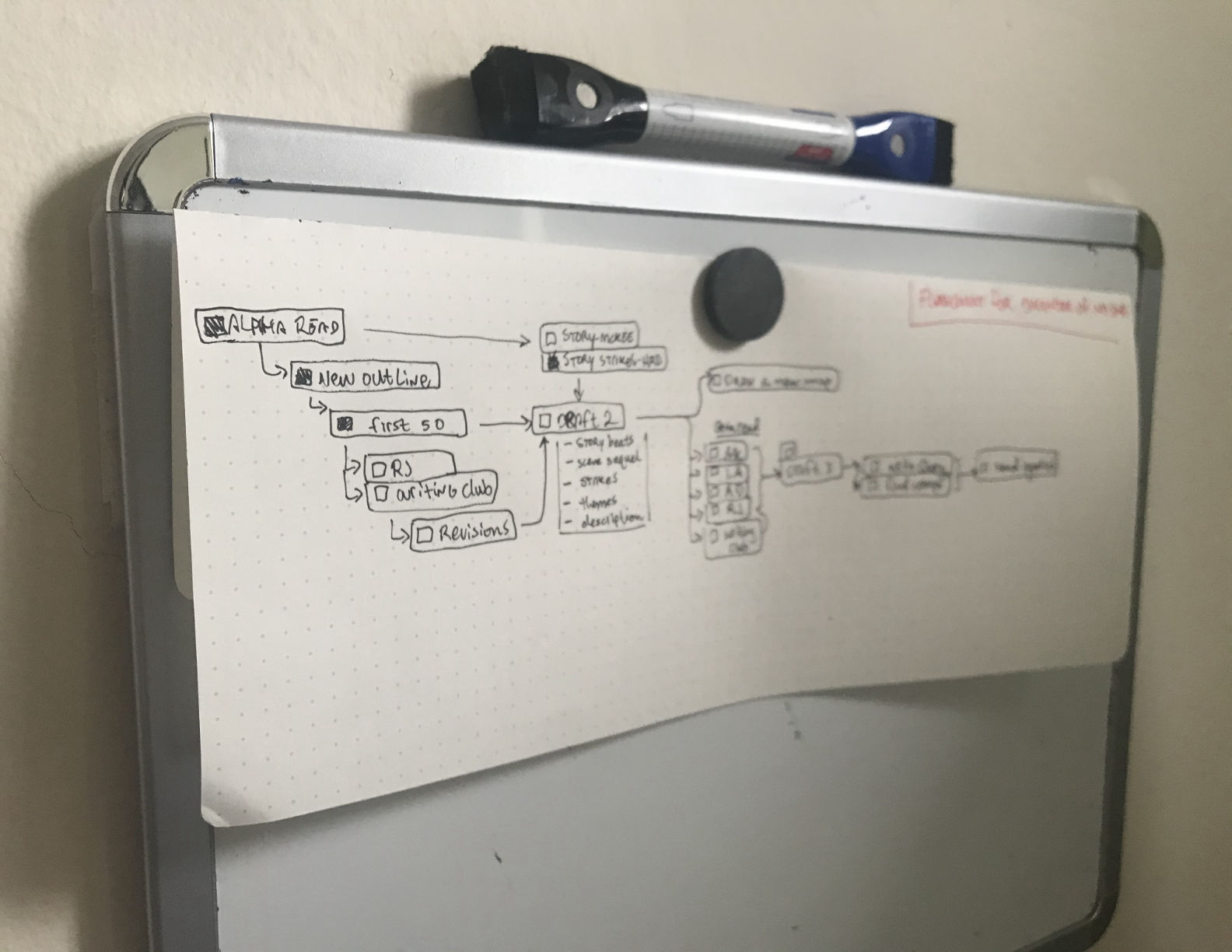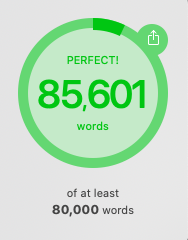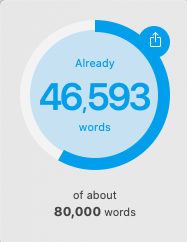
Stats on my work in progress

A friend of mine told me that I should find out how long it takes me to draft a novel. So I tracked my time (using Toggl) and logged my word count and time (using AirTable) and came up with the analysis below based on those stats.
My friend recommended this because I was
- Too in my head about the novel I have been working on for years and years
- Needed to try something new (“Can I even write a new story?”)
- Needed to try something easier (One POV, a simple story and plot)
Stats!
I started outlining this new book on 2021-03-31. Over the span of 9 days, I outlined for 6:55. I re-outlined at various points during the first draft, for a total of 3 days, for 3:35. Outlining in total took 10:30.
I wrote for 51 hours over the span of 50 days between 2021-04-13 and 2021-12-28 (from April to December). This means out of 258 days, I wrote for 50 of them. The biggest lulls happened in June (2 sessions), July (3 sessions), and August (0 sessions). October had 11 writing sessions and December (the last month of the first draft) had 14 writing sessions.
I wrote a total of 46,000 words. At my slowest, I wrote 420 words per hour; at my fastest, 1694 words per hour (excluding weird outliers). An average session yielded 940 words and was 1:02 long. My longest session was 4:26 on November 22, yielding 4356 words (with a 982 word/hour rate, on the average side). My shortest session was 10 minutes. This October 27 session yielded 317 words.
Don’t ever think you can’t sit down and write for 10 minutes.
Including outlining, I worked on this book for 60 days for a total of 61.5 hours.
Conclusion
The second draft will definitely be longer since 46,000 words is pretty short, but this will likely just include adding descriptions, fleshing out interactions, and adding new scenes rather than any restructuring of the plot. A welcome change from the fantasy epic I’ve been working on since I was a teenager.
I have started outlining a new novel as well since I had an idea while I was writing this one. Since I saw I could write 46,000 words in 61 hours, I thought surely I can do that faster than 258 days.

Looking Back at the Serial Release Project

Now that I am more removed from the serial release project, I wanted to reflect on how effective it was.
Pros
- It was very helpful to get feedback as I wrote. I was able to adjust the way I was writing to incorporate some of the previous feedback I got.
- People who would not have otherwise read my novel felt less pressure when not staring down a 300 page manuscript all at once.
- Having a deadline was very motivating. (But perhaps too motivating. See cons).
- The mere fact that people were actively reading my novel and waiting for it was very motivating. The time between finishing a novel and publishing can last years. Compared to something like posting a YouTube video (my partner posts 2 a week) or photos on Instagram, “posting” your novel can feel like an eternity. (Happy to debate the pros and cons of self-publishing). So, consistently pushing content every week to a real audience (made up of my very gracious friends) was itself motivating and rewarding.
Cons
- It worked for some readers to read week by week, but others felt guilty for falling behind and not being able to keep up. For those people, I ended up sending them a full manuscript once I was done.
- Having a deadline was motivating; however, it also motivated me to get a lot of writing done in larger chunks when I felt like it. It did not help in developing a habit of writing every day because I wanted some padding in the backlog. I even finished four weeks early!
- Readers rarely wanted to read more than 30 pages per week. Which I was able to outpace, so I had a backlog and therefore no feedback.
Conclusion
All-in-all, I am very thankful to my friends who contributed their time to read and give me valuable feedback on my novel. This is probably something I will try again.
I highly recommend this kind of thing. It is helpful for a couple reasons:
- People are going to read your stuff eventually, so get used to it early and often
- Sometimes you need a deadline

How I Am Planning My Revision

Once I finished my novel and received feedback, I knew I had to work out a plan for how to manage the revisions. I drew up a flowchart because my actual job is as a project manager (in the publishing industry, and yes, that hasn’t helped me get published yet, obviously).
Anyway:
- Alpha read. The alpha read is what I documented in my Serial Release series. To summarize, I had a group of readers give me feedback on the entire novel week by week as I wrote it. (These readers were friends who were nice enough to volunteer).
- From the alpha read, there is a quick branch off to re-reading Story by Robert McKee and reading Story Stakes by H. R. D’Costa. I recommend both. They are technically screenplay-focused, but the lessons are applicable to novel-writing as well.
- New outline. I created a new outline using Airtable, which is a database program. I learned about this method of outlining from a talk I went to at Boskone 2020. The panel was Pacing the Novel with Tabitha Lord (moderator), Melissa Caruso, Steve Miller, Paul Tremblay, and Sarah Smith. (I only list all of them because I don’t remember who made the recommendation! My bad). I will probably do another post about using Airtable. If you want to check it out, use my referral link, if you want. (It’s free).
- First 50 Revision. Next I revised the first 50 pages. This underwent two revisions before I sent it to my partner, famous Sims Youtuber Rebecca of BeccaTownSims and our writing club to read over. I am currently awaiting their feedback.
- Draft 2. This leads us to the second draft. This is the longest part, and I have also broken down the things I’ll be focusing on (AKA things I am bad at):
- Story beats. How does each beat fall throughout the book?
- Scene-Sequel. How are the scenes and sequels set up? How do they flow into each other? (Here is one of many articles on scene-sequel).
- Stakes. What are the stakes in this book? Am I reminding the reader of the stakes enough?
- Themes. How does this scene contribute to the larger themes in the story?
- Description. Is this described enough? I am mostly relying on my wife to ask me what the hell something looks like.
- Beta read. Once draft 2 is done, I will send it off to my beta readers, which include two of my former colleagues from our old literary magazine, Strangelet, my old roommate Aaron, my wife, and our writing club.
- I’ll also be drawing the map because maps are fun!
- Draft 3. Based on the feedback from the beta read, I will do another revision, and then at that point, that’s all I can do for now.
- Queries, queries, queries. Once I am done with the draft, I will research comparable titles, write the query, and then send those off into the black hole.
I am not naturally a very organized and focused person, which is why I try to make all these systems and checklists to keep myself from getting distracted. I also don’t always stick to them, but it at least provides guidance.
There’s another edge to this though. A lot of times I feel guilty for not following through on my plans, especially when I make plans like this. I also sometimes get impatient. But that guilt and impatience is not useful. So if you do something like this, take it easy on yourself. If a plan isn’t working, discard it or change it. You don’t owe your past self anything.
Anyway, I get my feedback on the first 50 next week. After that I will get back to work.

All Installments Scheduled for My Serialized Manuscript

After last week’s very productive writing sessions, I took more breaks as I wound down to the final chapters of the book. I still only missed two days of writing though, but I definitely needed those days to just not think about the book.

I will be releasing the rest of my book for feedback at a steady pace to my alpha readers. I will not inundate them with the amount of pages I actually ended up finishing week to week.
The quality of the last few chapters is suspect. I am OK with this. Due to the fact that I brought in material from previous versions and had to smooth those out and the fact that I was also in completely uncharted territory, the story being uneven here is to be expected.
In two weeks I’ll be getting feedback on my second draft of the first 50 pages from my writing group.
| Release Date | Hours per Week | Words Added |
|---|---|---|
| 3/30 | 3:20 | 12,645 |
| 4/6 | 8:33 | 774 |
| 4/13 | 10:21 | 25,764 |
| 4/20, blaze it | 6:50 | 2,406 |
| 4/27 | 3:45 | 3,361 |
| 5/4 | 4:32 | 7,432 |
| 5/11 | 17:13 | 12,332 |
| 5/18 | 26:29 | 10,639 |
| 5/25 | 7:02 | 13,480 |
| 3/23-5/25 | 88:09 | 88,833 written / 85,601 final |
(The ratio of old previous version material to new is probably about 20% to 80%, but I did not keep track of that.)

Serializing Getting Ahead of Schedule

This week was probably the most productive I have had in a long time. I benefitted from a random day off that the CEO gave us on Friday. I worked on my novel through the weekend and started into Act 5 (of 5). It started getting fun again. One day I spent nine hours on the book.

It was interesting to see how I reacted to such intense work though. I had basically not taken a day off from it the whole week, even though I had a three day weekend. After one of the days I realized I needed a break because not only was I mentally fatigued, I knew I wouldn’t get anything worthwhile done if I was still working late into the night. At the end of one of the days I wasn’t sure which way I wanted the story to proceed. I stopped writing, knowing I needed to sleep.
Sleep is really key because when you are faced with a seemingly insurmountable issue, your brain can clear out all the junk you’ve been accumulating throughout the day. When I woke up the next day, I didn’t know exactly which way I wanted the plot to go, but my mind felt clearer and had less of the noise of trying to solve yesterday’s problem. So I was able to figure out a direction.
This week I also sent my smaller writing group the revised first 50 pages of my manuscript. Pretty excited since it is the first draft of the new version of this story.
Hopefully they can also help me think of an elevator pitch.
Updated table below.
| Release Date | Hours per Week | Words Added |
|---|---|---|
| 3/30 | 3:20 | 12,645 |
| 4/6 | 8:33 | 774 |
| 4/13 | 10:21 | 25,764 |
| 4/20, blaze it | 6:50 | 2,406 |
| 4/27 | 3:45 | 3,361 |
| 5/4 | 4:32 | 7,432 |
| 5/11 | 17:13 | 12,332 |
| 5/18 | 26:29 | 10,639 |

Serializing My Novel as I Write It

I decided this year to do an overhaul of my novel. At 130,000 words, it was much more meandering than I wanted it to be. This is likely a consequence of me having been working on some version of it since 2003. After a few rejections from agents (I sent it out in August 2019, got most of my responses by December), I realized I wasn’t satisfied with it and stopped sending it out.
This year I tightened up the plot considerably and created a new outline. I am still figuring out the finer plot points as I go and come up with new ideas. The goal right now is 80,000 words.
In order to motivate myself during quarantine, I decided to do an experiment, suggested by my friend Steven.
I recruited a group of alpha readers from my friends. Every week, I will send them the most recent pages I had written that week. They will send me feedback.
I started on March 30. I am now halfway to the 80,000 words. At this rate, I should finish by June 29. If I don’t, it’s whatever. I still have to edit it anyway.
Some notes:
- I did start with some pages in the bank, so I had somewhat of a buffer.
- I am definitely reusing the material from the original draft.
- By week four, the readers had caught up to me! So I have been just going without a safety net since then.
- By week four, I started revising what the readers had given me (the first 50 pages) for a separate writing group I am a part of.
Statistics so far
Caveats:
- Not sure how accurate the app Ulysses is at daily word counts.
- Some of these are words from previous drafts that I had pasted in and edited to make sense in the new plot.
| Release Date | Hours per Week | Words Added |
|---|---|---|
| 3/30 | 3:20 | 12,645 |
| 4/6 | 8:33 | 774 |
| 4/13 | 10:21 | 25,764 |
| 4/20, blaze it | 6:50 | 2,406 |
| 4/27 | 3:45 | 3,361 |
| 5/4 | 4:32 | 7,432 |
| 5/11 | 17:13 | 12,332 |
Original Instructions
Thank you for agreeing to read this story. I’ll be sending updates every Monday.
I specifically want feedback on overarching plot stuff:
- Pacing and plotting (Can you follow it, are you compelled to continue reading and if not, what would draw you forward aside from being a good friend?)
- World-building (Is there too much information all at once? Not enough?)
- Characters (What is your opinion of them? Are they interesting enough to follow?)
I do also want to warn you that while some of this stuff is re-edited from previous stuff that I’ve agonized over for years, a lot of it will be brand new and therefore VERY BAD. Please keep that in mind. Writing takes a lot of drafts, but I mostly need feedback on overarching story beats and plot points.
Please do not give me feedback on grammar, spelling, punctuation, word choice (unless it prevents you from understanding what is happening). That’s for later.
Please send the feedback either by making a copy of the word doc (either as a google doc, libre office doc, or word doc) with track changes, or just via email.
Observations
I don’t think of shortening the book and changing the plot as compromising my vision. Is an 80,000 word debut novel more palatable to agents, publishers, and readers than a 130,000 word debut novel? I dunno. Probably. But the book wasn’t right in the state that it was in.
The changes I made were not a complete departure from the truth of who the characters are, what they would do, and so on. It was a change of the situation they were in. Putting them in more danger and putting them in each other’s way more frequently will reveal more about the kind of people they are.